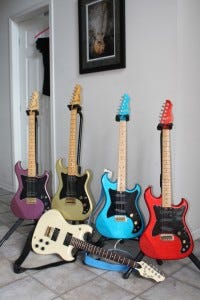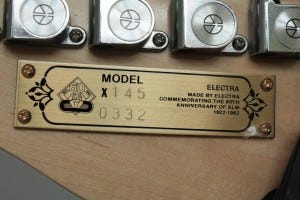1982 Electra Anniversary Editions

It's rare for anybody of modest means to be able to say "I have (whatever useless item) and nobody else does," but here you go: I do not believe anybody else in the world has as many 1982 Electra SLM 60th Anniversary Editions as I do. I own eight in total; three are duplicates of the ones you see here. All of these guitars were built by Matsumoku in Japan in the second half of 1981.
How many different 50th Anniversary models are there? There are two I know I don't have --- the four-string bass models with single and double pickups. I've missed a deal on both in the past and am still looking. Is that all there were?
It's possible that nobody knows, and therein hangs a tale of sorts.
As an Electra collector, you have to understand that you'll never catch them all. I have about sixty-three Electra guitars, with very few duplicates, but I'm not the biggest collector out there. There's a guy with about 110 different ones. He doesn't have them all. The two of us together don't have them all. There are well over a hundred different models of which we are aware as a collectors' community, and there are multiple finish variants, and so on, and so forth.

The SLM Anniversary guitars were variants of the standard Electra Phoenix range, painted sparkly colors and treated to all possible upgrades including solid "rock maple" bodies that make these bolt-neck Strat-a-likes as heavy as pancake Lesters. Nobody seems to know how many different ones were made, and certainly nobody knows which colors were used on which ones. The purple one you see above was commonly held to not even exist until a few years ago when somebody found one of them. I bought it recently. Nobody's seen another one. Sometimes the headstocks were painted, sometimes not. And the brass plates, as seen above, corroded to the point that they more often looked like this:

Electra collecting is a frustrating pastime. There are very few records. There were two different companies selling the brand, PCM and SLM, owned by two brothers who eventually drifted apart. There were at least four companies that built Electras in Japan, including Fujigen which basically was Fender during those dark days of the Eighties where no Fender guitars were built in the United States.
Think about that. There was a time where Fender just gave up and let an overseas subcontractor build the God-damned things.
That was the case in 1982 when my father took me to the String Shoppe in Columbus, Ohio and told me I could finally have an electric guitar. The Fujigen-Fender Strat was about $400. The Electra X130 was $345. It was a better guitar. It really was, and not by a little bit either. The woods were better, the electric components were higher-quality, the assembly was tighter. My father bought me an Electra. He was right to do so. Thirty-one years later, I can still play that guitar out. It works perfectly. I met my wife, the mother of my son, playing that guitar. I'll never sell it.
But if he'd bought me a Fender I might have been a little more enthusiastic about playing. I never thought I had "the real thing". I wanted a Fender. I didn't play as much as I could have, didn't practice as much, didn't treat my guitar with as much respect as I would have treated a Fender. That fifty-five-dollar savings probably changed my life as a musician to some extent. The smallest decisions often have the biggest impact in the long run, and you never know which ones will matter until it's too late.
Collecting Electras has been my way of apologizing to my original guitar for undervaluing it, for blaming it for my poor musicianship, for letting it fall down stairs and bang around in the trunk of my VW Fox. I take good care of it and all its brethren now. I own six of the ninety-nine instruments in its group of 100 serial numbers. I play them in church, during gigs, at home. I've never bothered to buy a Fender Japan instrument. I know which is better now.
Today, in 2013, I have top-end examples of everything from PRS Private Stock to Fender Masterbuilt Custom to Heritage to Gibson Custom to Fano to G&L to you name it. But if the day comes that my son wants to play guitar, I'll let him get whatever he wants. Even if that means that my Private Stocks will rust in the case while he plays an 8-string djent Schecter or something similarly awful. They say it's important to want what you have, and I agree. But, where possible, it's nicer to have what you want.

